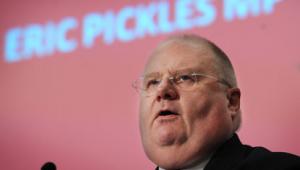The government’s plan for local referendums on council tax increases judged excessive by the secretary of state is not new. Michael Heseltine made a similar proposal nearly 30 years ago. We wrote a letter to the press opposing it on 10 July 1981 – the start of our writing-partnership.
A referendum on a council tax increase is not appropriate since the local budget is the result of a process of balancing expenditure priorities between services and between expenditure and taxation, which cannot be expressed in a simple yes/no question.
It is a centralising, not a localist proposition, since the referendums will be called because the secretary of state thinks an increase is excessive, rather than a local authority accountable to its local people.
We argued in 1981: ‘The government wants greater local accountability on the assumption it will give the answers it wants…One cannot believe both in local accountability and in central targets.’
It damages representative democracy, since it destroys the whole point of local elections, if elected councillors see their judgments based on their electoral promises overturned in a referendum called by a minister.
If referendums on local budgets are such a good idea, why not have referendums on tax increases by central government?
George Jones is emeritus professor of government at the London School of Economics and John Stewart is emeritus professor of local government at the University of Birmingham










